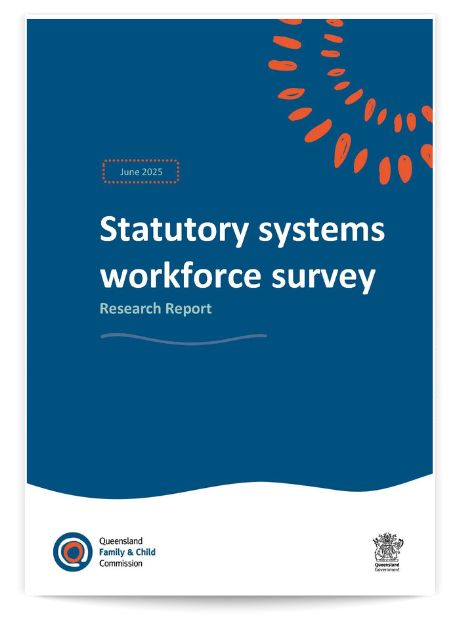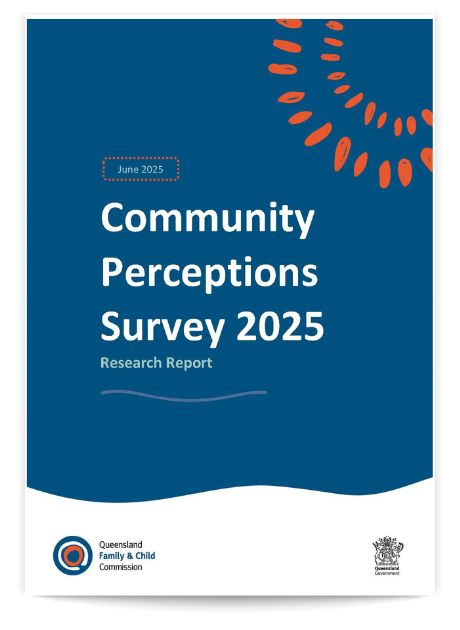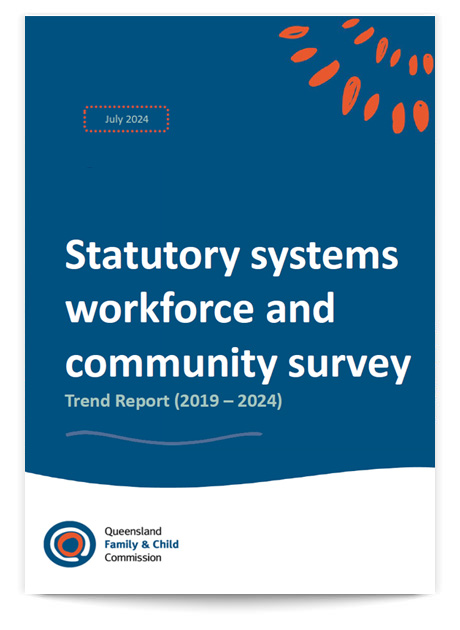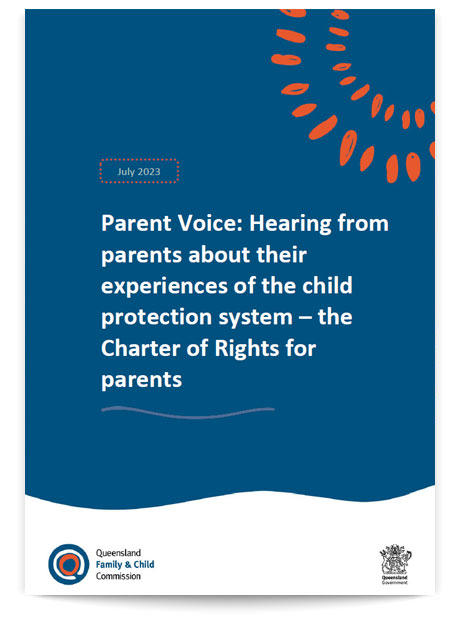- Home
- Sector
- Monitoring and reviewing systems
- ...
- Workforce and community surveys

Workforce survey
Our annual workforce survey asks workers in the child protection, family support and youth justice sector about their perspectives of their work and its impact. This year, 205 frontline workers completed the survey.
The responses contribute to our evidence base and provide insights into the effectiveness of the systems that interact with children, young people and families.
This year’s survey highlighted workers’ concerns around wellbeing and workloads, as well as increasing complexities in the lives of the families they work with.

Community perceptions survey
Our annual community perceptions survey measures the community’s confidence in the systems designed to support children and families. The information collected through the survey builds our evidence base and provides insights into the systems that interact with children, young people and families.
More than 3,600 Queensland adults responded to the survey, with parents and caregivers making up just over half of respondents this year. New data was also collected regarding parent’s support and engagement with their child’s health, culture, academic, sporting and social needs.
This year’s survey highlighted concerns around the cost of living and the negative impact this is having on families, but despite these concerns respondents had positive perceptions of their children’s futures. Community confidence and trust in the child protection system was also higher than reported in previous surveys.

5-year trend report
This report identifies overarching trends observed in our annual workforce and community perceptions surveys, since 2019.
It shows positive trends over time in the workforce’s responses around First Nations practices, including increasing understanding and application of the Aboriginal and Torres Strait Islander Child Placement Principle, positive attitudes towards Delegated Authority, and improved cultural appropriateness within youth mental health services. Positive changes were observed over time in the workforce’s agreement that children and young people are listened to and valued, with many workers agreeing they work in a Child Safe Organisation.
Parents and families voice survey
The views and experiences of Queensland parents and families involved with the child protection system are critical to assessing the system’s effectiveness and to informing the improvements required to empower them to care for their children.

We worked with Micah Projects’ Family Inclusion Network Southeast Queensland to launch the first Parent voice survey. This offered parents and families an opportunity to provide feedback on their experiences of Child Safety processes and about how the Charter of rights for parents is being upheld in child protection matters.
This is the first survey of its kind, providing new and important insights that will help us understand the effectiveness of the system and will provide a baseline to inform recommended improvements into the future.
Our report refers to parents and carers. Carers in this context refers to family carers, including grandparents, aunts and uncles, siblings or other family relatives.
System evaluation
As part of our system evaluation work, we conduct place-based studies in locations across Queensland to hear from local partners about how the system is working in these locations, and to gather evidence of what's working for children, young people and families, and why.
You can view the summaries of the key findings for each study below.
Community and workforce surveys
We also conduct regular surveys to understand what the community thinks about the child protection and family support system, and to gather the perspectives of the frontline child protection and family support workforce about practice and capability issues.
You can view the survey reports and summaries below.
The Queensland Government made a series of improvements to the state’s child protection system to help families care for their children. These improvements were recommended by the Queensland Child Protection Commission of Inquiry and were implemented through the Supporting Families Changing Futures Reform Program.
We led two evaluations of the reform program. The first focused on implementation of the reforms over the first three years of the program. The second examined outcomes achieved to 2020. No further evaluations are planned.
Implementation evaluation (2014–2017)
Our first evaluation focussed on how the Queensland Child Protection Commission of Inquiry reforms were implemented across the first three years. Some of our key findings included:
- The reform program introduced considerable changes to the child and family support system, and early evidence suggests that new policies, practices and services are functioning as intended. We need to stay on course and continue working together to embed the changes and allow time for the benefits to be realised.
- The continuing over-representation of Aboriginal and Torres Strait Islander children, young people and families in the child protection system is an ongoing concern that requires additional attention.
Our future program-level evaluations will focus on how the outcomes of the reform program are being achieved.
Outcomes evaluation (2014–2020)
Our second evaluation focused on outcomes achieved through the reform environment to date.
There is no question that a lot of activity has occurred in the course of implementing the reforms. The question is whether the best type of activity has occurred, and whether it has occurred in the best way for children, young people and their families. At present, outcomes data is limited or not available, so we cannot determine this. The data that is available, including the perspectives of stakeholders, indicates there has been limited (if any) improvement in the areas that need it the most.
Something needs to change. We are not suggesting another inquiry—what is needed is a shared child and family policy agenda that endures and provides certainty for the child protection and family support system and sector, and for the children, young people and their families who rely upon it.
The policy agenda must be developed with the direct and active involvement of Aboriginal and Torres Strait Islander peoples, frontline workers, and children, young people and their families. The child protection and family support system needs to measure what matters, share these measures, and evaluate individual programs and services at appropriate times to drive continuous improvement.
Our evaluation reports can be found below. Our overall evaluation findings are described in the Measuring what matters report. There are also three reports describing the results of ‘deep dive’ studies into areas of significant reform investment in more detail. These reports should be read in conjunction with Measuring what matters:
- Deep dive #1—Investing in family support services: Has it reduced demand on the child protection system and improved outcomes?
- Deep dive #2—Respecting the workforce: How did the Queensland Child Protection Reform Environment impact the frontline Child Safety workforce?
- Deep dive #3—Learning from evaluations: What have we learned and how has the child protection system responded?
Last updated
12 June 2025

